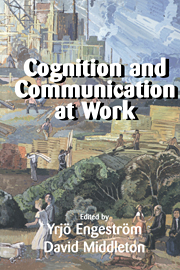Book contents
- Frontmatter
- Contents
- Contributors
- Acknowledgments
- 1 Introduction: Studying work as mindful practice
- 2 Distributed cognition in an airline cockpit
- 3 Constituting shared workspaces
- 4 Seeing as situated activity: Formulating planes
- 5 Convergent activities: Line control and passenger information on the London Underground
- 6 Users and designers in mutual activity: An analysis of cooperative activities in systems design
- 7 System disturbances as springboard for development of operators' expertise
- 8 Expert and novice differences in cognition and activity: A practical work activity
- 9 The tensions of judging: Handling cases of driving under the influence of alcohol in Finland and California
- 10 Talking work: Argument, common knowledge, and improvisation in teamwork
- 11 The collective construction of scientific genius
- 12 Experience and the collective nature of skill
- 13 Working together: Symbolic interactionism, activity theory, and information systems
- 14 On the ethnography of cooperative work
- Index
9 - The tensions of judging: Handling cases of driving under the influence of alcohol in Finland and California
Published online by Cambridge University Press: 05 June 2012
- Frontmatter
- Contents
- Contributors
- Acknowledgments
- 1 Introduction: Studying work as mindful practice
- 2 Distributed cognition in an airline cockpit
- 3 Constituting shared workspaces
- 4 Seeing as situated activity: Formulating planes
- 5 Convergent activities: Line control and passenger information on the London Underground
- 6 Users and designers in mutual activity: An analysis of cooperative activities in systems design
- 7 System disturbances as springboard for development of operators' expertise
- 8 Expert and novice differences in cognition and activity: A practical work activity
- 9 The tensions of judging: Handling cases of driving under the influence of alcohol in Finland and California
- 10 Talking work: Argument, common knowledge, and improvisation in teamwork
- 11 The collective construction of scientific genius
- 12 Experience and the collective nature of skill
- 13 Working together: Symbolic interactionism, activity theory, and information systems
- 14 On the ethnography of cooperative work
- Index
Summary
Introduction
Expert work has become an object of increasing attention among cognitive scientists (e.g., Chi, Glaser, & Farr, 1988; Ericsson & Smith, 1991). This research tends to view expertise in a social and cultural vacuum. More specifically, the following three dominant underlying ideas may be identified in mainstream cognitive research on expertise (see Engeström, 1989, 1992). First, expertise in a given field is seen as universal and invariant; differences are noticed in the degree of expertise, but differences in content and quality are largely overlooked. Second, expertise is viewed as consisting of individual mastery of discrete tasks and skills; the broader collaborative practice in which individuals are embedded is overlooked. And third, the development of expertise is seen as consisting of gradual accumulation of individual experience under the guidance of established masters; the reconceptualization of existing practice and collective generation of new models is overlooked.
On the other hand, social scientists have identified broad structural forms of the social organization of expertise; professionalism, bureaucracy, and corporatization. These pervasive forms are commonly depicted as structures that leave little room for construction from below. In a way, the lack of social context in cognitive analyses of expertise is complemented by a lack of agency in many social analyses of the organization of expertise.
Attempts to overcome and bridge this dichotomy of individualism and structuralism focus on local socially distributed activities (e.g., Chaiklin & Lave, 1993; Lave, 1988; Middleton & Edwards, 1990). In this chapter, I will present another attempt to transcend the dichotomy.
- Type
- Chapter
- Information
- Cognition and Communication at Work , pp. 199 - 232Publisher: Cambridge University PressPrint publication year: 1996
- 13
- Cited by

